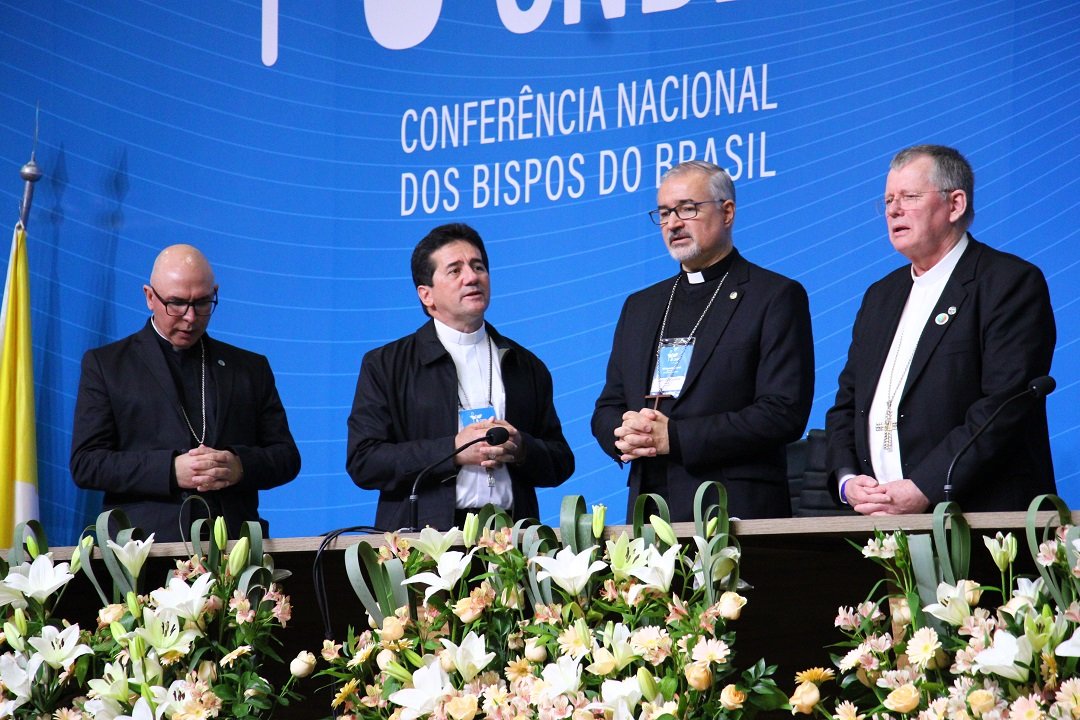
By Eduardo Campos Lima
SÃO PAULO (OSV News) — After the election of the new leaders of Brazil’s bishops’ conference April 24, two Afro Brazilian priests released a public letter criticizing the fact that most of them are white and affirmed that the Brazilian church’s “power structure” is tainted by “racism” and by a “pact of whiteness.”
During the bishops’ conference (known by the Portuguese acronym CNBB) general assembly in Aparecida April 19-28, Archbishop Jaime Spengler of Porto Alegre was elected conference president for the next four years.
Archbishop João Justino de Medeiros Silva of Goiânia was chosen to be CNBB’s first vice president, and Bishop Paulo Jackson Nóbrega de Sousa of Garanhuns will be the second vice president. Bishop Ricardo Hoepers of Rio Grande was elected to be the new secretary general. All of them are white.
“Looking at the faces of the elected bishops, how can we not discuss the racism that exists in the power structure that still dominates the Catholic Church in Brazil? How can we not debate the silent existence of a pact of whiteness in the Brazilian Church?” Father Geraldo Natalino and Father David Santos, two activists for Black people’s rights in Brazil, asked in a letter released April 25.
Fathers Natalino and Santos called the majority of white bishops among CNBB’s new leaders “an absolutism of whiteness.”
They added that most Black priests in Brazil work in parishes in deficit. “Church racism needs to be fought,” the authors affirmed in the letter.
Although there are no precise numbers concerning the Brazilian church’s racial reality, the number of Blacks among the country’s 483 bishops was recently estimated at 37.
Among priests, Afro Brazilians also are a minority. A study on the clergy conducted in 2018 showed that 67% of the 27.300 Brazilian priests said they are white. Fifty-six percent of Brazilians (the country’s total population is 216 million) say they are Black, which is the the largest population of people of African descent outside of Africa.
Those are unacceptable disparities in Father Santos’ opinion. The Franciscan priest decades ago founded a nongovernmental organization (NGO) named Educafro, which promotes education for Blacks and the poor.
He told OSV News that the problem begins in the poor neighborhoods, “where the presence of the Black people in the Catholic parishes is weak, given that most of them migrated to evangelical churches.”
Dioceses and congregations usually do not put enough effort toward drawing vocations in those communities, where most residents are Black, Father Santos said.
“The CNBB should conduct a study in order to find out why the Afro Brazilian people massively abandoned the Catholic Church,” he said.
CNBB’s new leaders must address that crisis and take several measures, like increasing the church’s closeness with Black communities, Father Santos stressed.
The episcopate also needs to work to increase the proportion of Blacks among the bishops, Father Santos argued. Quotas should be established to allow Afro Brazilian priests to go to Rome to complete their master’s degrees and doctorates. A norm should establish that in any vacant diocese the names of at least two Black priests must be considered in the process of deciding on a new bishop, he suggested.
Fathers Natalino and Santos’s letter was received with reservation by some members of Brazil’s episcopate. Archbishop Zanoni Demettino Castro, who heads CNBB’s Afro Brazilian pastoral ministry, told OSV News that “Black bishops have been occupying more and more spaces.”
“Brazil suffers with systemic racism, but I did not see that kind of perspective in CNBB’s general assembly,” he said.
Archbishop Castro, who is Black, considers that although the letter “expresses a relevant opinion and is connected to a legitimate struggle,” the authors had not talked to the bishops before releasing it, so they did not know their criteria in the conference elections.
“There was the possibility of voting for a Black bishop for vice president, for instance, but we thought that the geographical element was important and that a bishop from the northeastern part of Brazil should be chosen,” he explained, alluding to the election of Bishop Nóbrega de Sousa of Garanhuns, which is in the northeast state of Pernambuco.
Archbishop Castro added that three of the 16 new heads of CNBB’s Pastoral Episcopal Council are Black bishops.
“CNBB recently decided that the Afro Brazilian pastoral ministry’s basic study will become one of the official documents of the conference as a whole,” he confirmed.
Archbishop Spengler told OSV News that more and more Afro Brazilians have been discerning a vocation and joining the clergy.
“I think we already have a vigorous path being followed. We have had great progress. But we can do more,” he said.
Archbishop Spengler recalled that “in a not-so-distant past a resistance in welcoming candidates (to priesthood) with Indigenous and African descent was reported.” Nevertheless, he said, “there have been remarkable Black members of the Brazilian clergy throughout history, including leading church artists and musicians.”
He emphasized that there is a “historical debt with the Afro-descendants in the Brazilian social context, a reality that also impacts the Indigenous peoples.”
“A society’s riches can be analyzed by its ability to welcome, respect and integrate differences. We need to promote the respect to diversity,” he concluded.

Black, brown, yellow, and white fellow mortals are pilgrims on a grand journey. – Dr. Cajetan Coelho